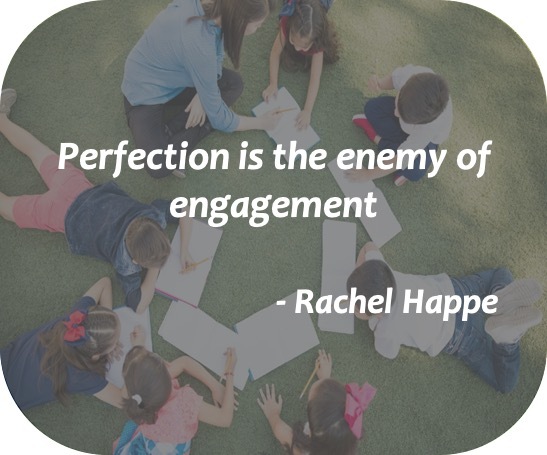I am lucky to work with some of the best community managers in the world and over the years, we’ve learned a lot together about how to encourage and inspire engagement. Interestingly, the most valuable engagement requires a focus on both high-level community strategy and how it is translated into policies, governance, and guidelines while also maintaining a micro-focus on the tone and wording.

What I’ve noticed over the years is that perfection is the enemy of engagement – and that, more than anything, is difficult for people to accept. In our culture and our organizations, we are so often judged when our grammar is poor, when we don’t do the research to answer our own questions and when we say something perceived as dumb because we lack experience…. ironically all the things that encourage engagement in communities.
What we’ve found is that engagement is often prompted by someone in need – and often arrested by authority. In many ways, the language of engagement runs counter to the language of business.
When you are trying to engage – instead of trying to explain – we have found some of the following practices encourage engagement.
Do
- Share an opinion or disagree by using phrases like ‘In my experience…’, ‘My perspective is…’ or ‘From my point of view’ – this signals that there is room for other people to have a different perspective or set of experiences and opens the dialog in a way that is respectful, even though you disagree. This is critical online because others cannot see your body language.
- Give people the benefit of the doubt and assume good intent – often, even if the intent is not exactly positive, by assuming good intent you will help the other person to engage in a constructive conversation vs. a confrontational one.
- Use pictures especially in unexpected ways. Instead of simply writing ‘Have a good weekend!’ include a link to a picture of a beach, or a cocktail, or something else you know the other person will be doing. Why? Getting the other person to smile will give them a positive association with you, your message, and your interaction.
- Use emotional markers whether those are exclamation points, emojis, or emoticons. This can seem silly but, when people can’t see your body language these markers help them understand your emotional position. When you seem open, friendly, and excited they are more likely to engage with you.
- Be aware your digital body language. How you respond and in what frequency matters.
- Ask questions and be curious. Even if you have just answered a question, there is no need to close the conversation – follow-up and ask why the person is asking or ask for additional clarification – you might be surprised that what they need is not the answer to the question they asked but a different thing altogether because they didn’t really know how to ask the question they needed answered.
- Be open-ended – suggest that something ‘might’ or ‘could’ work – unless you are speaking about a technical, urgent or specific thing where there is a clear correct answer and even then, it is often best to get a subject matter expert or peer to be the definitive voice.
- Ignore a conversation. If you are a community manager or executive, once you step into the dialog you can very easily shut it down because of your perceived authority so ignoring the conversation may be the best way to encourage engagement.
Don’t
- Use absolutes, deflections, or judgment words like ‘no’, ‘but’, ‘should’ and ‘you [are wrong/should/think]’ unless you really have to. All of those words and phrasing can have an arresting effect on conversation and make people more defensive than they would otherwise be.
- Be more declarative than you have to be. This is tough – in business, we are encouraged to be declarative and assertive but the more we complete thoughts and arguments, the less room there is for other voices, especially if you are an authority figure.
- Add fuel to fire. Always verify what you are hearing before you pile on to good or bad news.
- Assume you know what another has experienced or is feeling – ask and don’t judge.
- Make promises you can’t keep. Listen, acknowledge and ask questions but do not try to solve problems that are beyond your control or make promises that are dependent on others before you’ve confirmed that it’s possible.
What other techniques do you use or you’ve seen used effectively?
